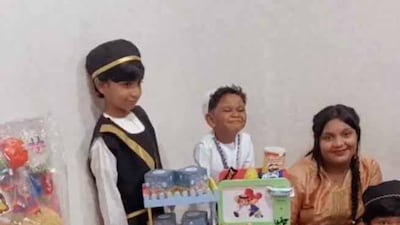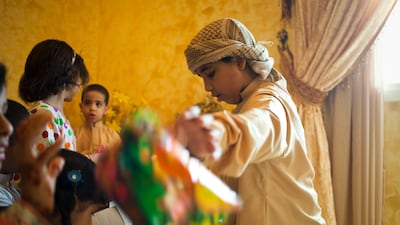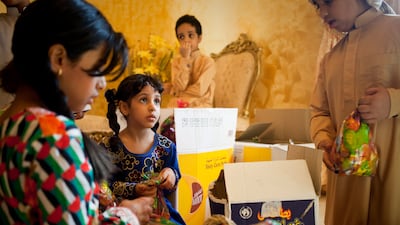If your doorbell rings on Monday and you are greeted by children whose singing may sound a little closer to screaming, do not be alarmed.
This is not a mistimed trick or treating spree, this is Haq Al Laila.
Also known as gerga’aan, the annual Gulf celebration gives children an excuse to demand treats from their family, friends and neighbours.
What is Haq Al Laila?
It is a tradition celebrated in Gulf countries. Children wear traditional clothes and carry colourful woven coloured bags, going door-to-door singing in return for nuts and sweets.
The rounds begin after Maghreb prayers and the most eager children will often shout the songs rather than singing them, hoping it will lead to a greater bounty.
Some homes expect so many visiting children that they distribute more than 10kg of sweets during the celebration, usually purchased from supermarkets and other shops in special Haq Al Laila packages.
When it is celebrated?
The annual event, which means ‘For this Night’, is celebrated on the night of Shaaban 15 on the Islamic calendar — during the month that precedes Ramadan. This year it falls on Monday March 6, but celebrations tend to begin early.
The same practice is celebrated on the 15th day of Ramadan, but called gerga’aan in Iraq, Kuwait, Qatar, Bahrain and some cities in Saudi Arabia.
It is celebrated on the same day in Oman too, but called Qaranqasho.
Some trace the tradition’s origins to a simulation of one of the first Ramadans in Islam when Fatima, the daughter of the Prophet Mohammed, distributed sweets to the people two weeks into the holy month.
Others, however, say it’s a celebration that predates Islam and could even be the basis for Halloween’s trick or treat tradition.
How is it marked?
The tradition of going door-to-door is still practised, although it is not as widespread as in the past. Neighbourhoods where children can still be heard in the streets include residential areas in Dubai, Sharjah, Ras Al Khaimah and Khor Fakkan.
Children sing in Arabic “Atona Allah yatek bet Makkah Ywdekom” which translates to “give us something so that God will give you something and bless you with visiting the holy mosque”.
Evenings often end with children rifling through their loot and comparing yields.
Recently, Haq Al Laila has become a more organised celebration and are held in schools, government offices and in homes.
People prepare boxes or small bags filled with sweets and hand them out to the children.
This year, celebrations are back in full force after Covid-19 restrictions prompted festivities.
Expo city Dubai will inaugurating its "Hai Ramadan" with its own Haq Al Laila opening weekend. Families will be able to shop for Ramadan essentials in the night market while taking in cultural performances.
In the heart of Dubai, a 10-day festival has kicked off at the historical Al Shindagah neighborhood to celebrate Haq Al Laila. An extensive programme of events and activities has been happening from February 26 to March 7, with the aim of highlighting the importance of this tradition.










